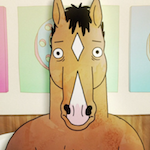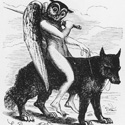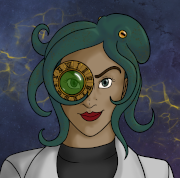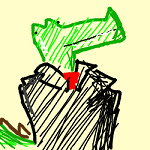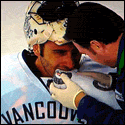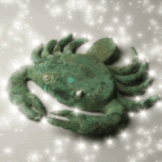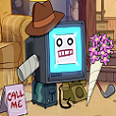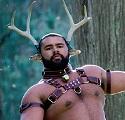|
magnificent7 posted:I absolutely second or third Writing Tools, the book recommended by Chillomatic. He recommended it to me two or three times and I replied similarly to the way you replied, and then I read the book, and now suggest that book as well. Just want to back this up. Along with How Not To Write A Novel it's probably one of the best writing books available, and not nearly as authoritarian as The Elements of Style.
|
|
|
|

|
| # ? May 9, 2024 03:38 |
|
Purple Prince posted:How Not To Write A Novel
|
|
|
|
How Not To Write A Novel is one of the funniest god drat books I have ever read in my life. This remains my favorite bit from it, by far: (on the risks of flat characters who don't emotionally respond to anything that happens in the scene) quote:But when he pulled the covers from the naked form, it was not his wife there at all—it was the lovely Veronica, his brightest and most eager graduate student, wearing nothing but a tattoo of Leonard Cohen.
|
|
|
|
Chillmatic posted:How Not To Write A Novel is one of the funniest god drat books I have ever read in my life. See, I'm glad you ninja-edited that parenthetical because I was reading that thinking "poo poo, I mean it's a bit dull, needlessly sexualized, and things seem to twist and turn with little purpose, but I can't really find anything egregiously off here." Clearly I need to pick up those two books, like, yesterday.
|
|
|
|
Has anyone here taken a short story or novella and converted it into a longer work? Right now I've got a finished novella, but my mind keeps wandering back to the characters and world, and I keep inventing all these complicated scenarios in stray moments that exist outside of what I've already written. On one hand, I know that we're supposed to like the characters and world we're working in, but on the other hand I feel strangely guilty about it. Like it's self-indulgent to try for a full novel, as if I'm writing fanfic for myself. I am fully aware of how insane that sounds.
|
|
|
|
Crisco Kid posted:Has anyone here taken a short story or novella and converted it into a longer work? You are allowed to indulge yourself as a writer sometimes, you know. Going off on wild tangents with characters you enjoyed writing may or may not be publishable, but even if it sits on your hard drive forever, the exercise isn't a complete waste of time. I dunno, it seems to me like saying, "I've been practicing the piano for ages for my upcoming Grieg concert. I just want to bust out some jazz once in a while because I enjoy it, but I can't possibly justify playing something that I'm not going to perform." To which I say, hell with that. Have some fun once in a while, dammit. Edit: And you may find you do have enough developed subplots and emerging resonant themes to turn your novella into a novel, but if you don't, you still had fun writing it, and pieces of it may help you understand your characters more so you can do a really tight revision. Stuporstar fucked around with this message at 06:21 on Aug 2, 2013 |
|
|
|
Orson Scott Card had great success turning the original novella of Ender's Game into a novel.
|
|
|
|
I just bought a book recently to help with my writing among others. The first one I started reading is titled A Writer's Guide to Characterization. If you're looking for a book to help you characterize, I think I would look elsewhere, or at the very least skim this in the book store. It's helpful to some degree, but I feel as though I could have Googled for information that this book covers and gotten most of what it teaches. I've actually found a handful of typos and there are some formatting inconsistencies, and the included questionnaire to see how your characters fall under archetypes takes around thirty minutes per character because of how confusingly it's formatted. EDIT: I'm currently on the Romantic Relationships chapter, and I guess the advice in that chapter is decent, but it requires that you have read the first chapters about archetypes so you can see which ones fall in situations best. I do think archetypes have their place in fiction and characterization, but at the same time I think relying on them too much is a crutch that prevents you from making characters see their full potential. An ideal recurring character would embody at least three or four attributes from archetypes to a reasonable degree, not just one of them. I always felt single archetypes are better for those background characters so that you can at least know who they are faster without them having to take up too much of your time. SirSigma fucked around with this message at 17:37 on Aug 2, 2013 |
|
|
|
Yeah, I steer clear of anyone who recommends following archtypes as a way to build character. It's sure the fastest way for a lazy hack to build unoriginal characters for their cookie-cutter action novel. I knew I was onto something when I read similar bad advice and realized my main female character didn't fall anywhere within maiden/mother/whore etc. Jungian stereotypes and was instead treated like a real person with a job and stuff.
|
|
|
|
It's still helpful keep archetypes in mind as you design a character, imo. One way I would use them is to create a very archetypal character, then twist or innovate that character in some interesting way; they would seem generic at first, but would develop into something far more interesting. It also might be interesting to put an archetypal character in a story in order to later use that character in a juxtaposition in order to make another far more interesting. But other than that I agree that generally basing characters off of archetypes is a bad idea.
|
|
|
|
Basing realistic characters off archetypes is totally contrary to the spirit of Jung's psychology. One thing he was always very clear about is that no person is an archetype: archetypes are just images with a very strong (primal?) bundle of complexes tied to them. If you plan to write myths, or give some character or situation myth-like qualities, then you might find using archetypes useful. If not they're mostly of theoretical interest.
|
|
|
|
If I think about it, I think archetypes probably have their place if you're writing something comedic and unrealistic. The book I'm reading keeps supporting the archetypes with examples of how to put characters of specific archetypes in unlikely situations and to think of how they'd react for laughs and comedy. The author also defends archetypes by saying that they are familiar and that when we see them in media, we might be more inclined to think they feel and develop more realistically. But that's probably because we'd be able to predict them more easily rather than the characters actually seeming more realistic. I also kind of don't like this whole approach the book takes on the archetypes by breaking them down by introversion and extroversion, their different kinds of archetypes, etc. It feels like almost like the over-categorizing that goes on with TVTropes. But to be fair, I guess this book helps you choose what a character does in a situation or another without it feeling unrealistic. Something I don't quite get is how the book shows how the archetypes will or would probably interact with each other, and how they'd get along in opposite-sex situations, with a legend of "happy drama mask" being that they get along from the beginning, and "sad drama mask" being that they clash. When I read most of the passages, it just seems like they can get along, but it's always like "X archetype will teach Y archetype about not being so tense, and Y archetype will teach X archetype to take things seriously", or a lot of that. There's also a lot of copy-pasting in this section, and as a result there's some pronouns that are unchanged. I swear I had found a typo somewhere in one of the passages where the gender switches mid-sentence. I think it was something like "She's really serious about figuring it out, and eventually he will." And it isn't like the sentence was referring to anybody else. Aside from a few typos (including a really embarrassing one where the sentence has an unnecessary "a" inserted. Example: "She's also quite a collector with a books." Not the exact typo, but it was a mistake like that), there's a few parts where the formatting is kind of inconsistent. I was reading through the three types of Romances, but the font sizes changed on the same two pages in front of me. In the first section there was text reading the Cinderella example, the text says "Romantic Themes:" beneath it in bold, and then on the next page (the page to the right; I didn't turn the page), it starts with the Beauty and the Beast example and the same text is there in bold, but a larger font. These don't necessarily cripple the book, but they make me feel as if somebody didn't want to edit this book before publishing it. I'm starting to wonder if I should just skim through the rest of it and return the book. I have a few other books I've yet to start that look promising. EDIT: I just skimmed the rest of the book and found the last section was about animal archetypes. They actually seem a lot more helpful than the initial archetypes because those were very gender-specific and seemed cookie-cut. The animal ones describe a type of character, but then they make it worth it because they describe a valuable thing that type of character could learn or try to overcome. That makes a big difference because this book is supposed to be about characterization, not archetypes. SirSigma fucked around with this message at 02:57 on Aug 3, 2013 |
|
|
|
SirSigma posted:I also kind of don't like this whole approach the book takes on the archetypes by breaking them down by introversion and extroversion, their different kinds of archetypes, etc. It feels like almost like the over-categorizing that goes on with TVTropes. But to be fair, I guess this book helps you choose what a character does in a situation or another without it feeling unrealistic. See, this is how the blog post I read about archtypes struck me as well, as similar to Troperism in how it talked about using archtypes to build characters. I can't find the post, because it popped up on my blog aggregator weeks ago, but the dude was trying to cram James Bond into the "Businessman" archtype, and it read like someone trying to match their day up to their horroscope, so the example didn't help his argument at all. ViggyNash posted:It's still helpful keep archetypes in mind as you design a character, imo. One way I would use them is to create a very archetypal character, then twist or innovate that character in some interesting way; they would seem generic at first, but would develop into something far more interesting. It also might be interesting to put an archetypal character in a story in order to later use that character in a juxtaposition in order to make another far more interesting. I'd like to think writers grow out of using archtypes or tropes like crutches once they find they have a real character on their hands, one that grows organically as you fire them in the crucible of conflict and extrapolate your own life experiences to help them navigate through those conflicts. This is probably the point where writers starts finding their voice.
|
|
|
|
Organisation and planning can go a long way but it's definitely real easy to fall into a pit of worrying too much. Be it character archetypes or where your story will fit into the market. Just try and tell what you have in you and you'll write your best.
|
|
|
|
I thought this was a really interesting AMA on reddit: http://www.reddit.com/r/IAmA/comments/1jlp04/iama_richestorags_thriller_author_whose_first_two/ The guy sold two books to publishers, got a big advance, and then the books sold like crap so his publishers dumped him.
|
|
|
|
Purple Prince posted:Basing realistic characters off archetypes is totally contrary to the spirit of Jung's psychology. One thing he was always very clear about is that no person is an archetype: archetypes are just images with a very strong (primal?) bundle of complexes tied to them. In short, I agree most strongly with this viewpoint. ^^ I think Stuporstar is correct in that going by tropes (since people have been mentioning TV Tropes lately) can make characters and plots stale and cookie-cutter. However, I wouldn't consider stereotypes and archetypes as being the same when it comes to literature. Just look at the classic Hero's Journey idea. SirSigma has a point. Background characters can be one dimensional to fill a necessary role. If you find yourself liking the stock character enough to flesh out the backstory and involve them more centrally, then they can develop into a fully formed character that resonate as more realistic.
|
|
|
|
My copy of the book that Chillmatic recommended me on the last page (Writing Tools: 50 Essential Strategies for Every Writer) just arrived. I've read 2 pages into the first tool and it's already helpful. I think I'll like this book. e: Why not just link to this book or mention it in the OP? ViggyNash fucked around with this message at 20:49 on Aug 3, 2013 |
|
|
|
That Writing Tools book should be essential reading for everyone in this thread.
|
|
|
|
Also it's printed on good-quality paper with a nicely-textured front cover, and has a simple and classic design which makes it look classier than Audrey Hepburn in Armani. It is a perfect example of why physical books are Just Better.
|
|
|
|
Purple Prince posted:Also it's printed on good-quality paper with a nicely-textured front cover, and has a simple and classic design which makes it look classier than Audrey Hepburn in Armani. It is a perfect example of why physical books are Just Better. I wouldn't go as far as making that conclusion, but I agree that the physical book itself was really well made. I've now read through about 3 of the 50 tips and would already wholeheartedly recommend this to any writer looking to improve his or her skills, especially to a novice like myself.
|
|
|
|
Tell ya'll what, I've added it to the creative resources OP.
|
|
|
|
I just read Tool 5 in the Writing Tools book, "Watch Those Adverbs", and I have a question about it. The point he made, as far as I understood it, was that using adverbs solely to intensify a verb just makes a sentence more wordy and is generally redundant, and that they should be used instead to modify a verb in a way that differs from the verb's initial connotation or implied meaning. However, at the very end, he mentions JK Rowling and how the Harry Potter series was gratuitously coated with adverbs. But he didn't explore why she did so. I thought about it for a bit afterwords and came to a conclusion: she did so to make her books more accessible to younger audiences. Her audience isn't always going to understand the implied meaning or inherent connotation of a verb, or maybe it's a new word that they haven't learned yet, so she supplies adverbs in order clearly define what meaning she wants to convey. I wanted to run this by you guys to see what you think about it.
|
|
|
|
ViggyNash posted:just read Just messin' with you. :P
|
|
|
|
ViggyNash posted:
What you are saying is probably true, but I also think the author wanted to emphasize his "These are tools, not rules" thesis.
|
|
|
|
My rule of thumb is that adverbs should be removed unless doing so would change the meaning of the sentence.
|
|
|
|
systran posted:What you are saying is probably true, but I also think the author wanted to emphasize his "These are tools, not rules" thesis. In the other tools he managed to thoroughly cover both why you might want to use it and why you might not, at least where it applies. I found it odd that he mentioned JK Rowling for no other reason than to whimsically criticize her style without any sort of explanation. crabrock posted:Just messin' with you. :P Reading through what I've written so far, that actually is an issue I need to tackle. Seriously, thanks for pointing them out.
|
|
|
|
ViggyNash posted:In the other tools he managed to thoroughly cover both why you might want to use it and why you might not, at least where it applies. I found it odd that he mentioned JK Rowling for no other reason than to whimsically criticize her style without any sort of explanation. The point of the tool is that adverbs should only be used where they modify the meaning of a sentence. It's about avoiding redundancy, not adverbs themselves. You could flood the reader with a deluge of adverbs but be readable, or expunge them all and murder your prose. No adverbs means less detail in your writing. Many adverbs means redundancy and purple prose. The former is a lesser sin than the latter. If you can use adverbs effectively (ha!) you don't need the rule. The tools exhort you to learn the rules so you can break them well. That's all. EDIT: As for JK Rowling: she's not a linguistic magician, but she doesn't need to be. It's better to use an adverb than be unclear, which is why they're such a seductive crutch. EDIT2: ViggyNash posted:I wouldn't go as far as making that conclusion, but I agree that the physical book itself was really well made. I confess: I'm biased. I don't like eBooks. They have no soul. Purple Prince fucked around with this message at 22:22 on Aug 4, 2013 |
|
|
|
Purple Prince posted:I confess: I'm biased. I don't like eBooks. They have no soul. People said the same thing about the printing press, that only a hand-lettered manuscript could have a "soul." Fetishize a mass-produced physical product all you like, but please stop yammering about it on this electronic message board thread when it's here to talk about the important bit of fiction, which is the words you type onto the computer which eventually make it into the book. Thank you.
|
|
|
|
E-books rule. I just heard about that writing tools book ten minutes ago and now I own it. It rules too.
|
|
|
|
There's an interesting question here: How do you think the medium a book is presented in (i.e. eBook or physical book) affects the reading experience? Personally I think that the physical book allows one to become more immersed in the language because the text occupies space. You can flick between pages of the book with relative ease, make notes in the margin, dog-ear particular pages, and so on, all of which are more complicated on an eBook. The book also has a symbolic function which is different to that of an eBook - a house full of bookshelves has a completely different feel to if all those books were in a Kindle. From a pragmatic point of view they are the same, but emotionally and symbolically the two are completely different. The eBook is convenient and allows one to get most texts quickly and easily, but this convenience speeds everything up and removes some of the relaxing properties of reading. A physical book is archaic, but this might be a good thing - in many ways books are the one refuge from the extreme pace of modern life - you have to take time over a book and focus on it to get the most out of it. Am I getting off-topic here? This discussion seems like one worth having in a thread about writing, because it's about how readers interpret what we write. In Search of Lost Time only seems to make sense as a book; as an eBook the convenience of the device would contrast with the ponderousness of the text.
|
|
|
|
I usually find that the people who have problems with ebooks are the people looking for problems with ebooks. I know what you mean about a house full of books, though, and I don't think it's uncommon for people to own a load of ebooks as well as physical books. With that said, I don't think ebooks will ever replace physical books. Ebooks just replicate physical books, and don't offer anything new, so they can only really go along in tandem. As far as reading goes, I don't think there's any difference unless you let there be one.
|
|
|
|
PoshAlligator posted:Ebooks just replicate physical books, and don't offer anything new, so they can only really go along in tandem. I've almost entirely stopped buying physical books, for two reasons. First, I do a lot of commuting and traveling for work. An eBook means I can carry several dozen books around for less than the weight of one paperback. This is the primary value in an eBook reader, I find. When I ride public transit, at least half the readers use some kind of screen, whether eBook or tablet. Second, I'm an expat living in a non-English-speaking country. Ordering physical books takes a few extra days for them to arrive and often incurs customs/taxes on top of the current price. An eBook costs less to start with, plus I don't have to pay anything extra and can download it immediately. This is especially valuable if a business trip gets extended and I run out of reading material. In the Olden Times, I'd have to hunt down the city's English bookshops; now I just need an internet connection. It's a niche case, but you can see the value there. Physical books have two values. First, obviously, is the text itself. The second is the appearance - as noted above, "a shelf full of books" has an intellectual air and presents guests with a certain statement, and some books are simply pleasant-looking. I have a hardcopy of the Feynman Lectures and they're quite pretty.
|
|
|
|
One pertinent difference for me is that if I drop a book (I fumble things a lot), the worst that happens is a few pages get bent. If I drop a Kindle then that crack is the sound of a hundred dollars disappearing. It helps that most of my books lately have been free. I work two blocks from the NYPL and I move through those fuckin shelves like Pac-Man. Wakka-wakka.
|
|
|
|
I like being able to carry my whole reading collection with me at all times, I like the number of free classic books (and sometimes authors will even release the first book in a series for free to build interest for the rest of their books), love the near-instant downloads, love that at least with the Kindle it's pretty easy to get a free replacement (At least the first time you inevitably break it). Oh, and for some reason, reading real books in a moving vehicle makes me sick, but reading an e-reader doesn't. That discovery was a seminal moment in my bus-riding career, I tell you. I don't understand people's attachment to the medium of physical books. For me, the words and the paper and even the plastic and circuitry are really an obstacle to the story, no matter how unobtrusive we try to make it. The story happens in the brains of the author and the readers. The rest is just instructions, the blueprints to a building. So I just can't really give any shits about the medium of the writing except in the case of books like House of Leaves or Infinite Jest where flipping through the pages is actually part of the experience. But most books do not intentionally do that. Also I like anything that makes me feel like I'm living in the future, like tablets out the rear end.
|
|
|
|
I think when books eventually start to really embrace the ability to be digital we'll see a move away from physical, but only if that actually happens. If anything, physical books limit ebooks too much due to the replicative nature of them. Another way to look at it could be that if ebooks increase in market share enough we're start getting more books that are only really possible in digital. I don't really understand it either and it's weird, but that's what all of the digital fiction lectures I've attended have spoken about. 
|
|
|
|
I had a big head-exploding paradigm shift over the weekend. Many of the articles/books I've read break writing into categories, books and not-books: (short stories, novellas, etc). But with e-publishing now, that model is broken. Back in the day, you had to write a 50,000 word story to be considered for publication as a novel. I've been writing my story, fluffing poo poo out, sweating it to hit that 50,000 minimum and just decided gently caress that, write the story, care about word-count later. Yes. YES. I should already be thinking like that, but that 50K number has been another self-doubt hanging over my shoulder while I write. I'm glad to shake off even just one of the shackles of self-doubt.
|
|
|
|
This whole discussion is like watching the 1998 hand-wringing when Napster broke the mold for major labels and commercial radio.
|
|
|
|
magnificent7 posted:I had a big head-exploding paradigm shift over the weekend. Many of the articles/books I've read break writing into categories, books and not-books: (short stories, novellas, etc). I'd say 50k is a little on the short end unless it's YA (for print). If anyone is interested an agent told me (so this is just what they'd look for) 90k-100k for general, commercial fiction. 60k-80k for literary fiction. Historical romance 90k-110k. Contemporary romance 80k-105k (though romance is pretty varied, series romance is shorter). Cozy mysteries 60k-80k. Bigger mysteries 85k-105k. Big thrillers 90k-105k. Scifi/Fantasy 90k-150k. YA 50k70k. Non fiction is all over but generally 60k-90k. That's just one person's opinion I guess, but it might be of some interest to someone I guess so I'm putting it here. There is a definitely bigger market for shorter works via ebook than physical, though. I suppose the cheaper prices means that people can spend a few dollars on something short and not feel ripped off.
|
|
|
|
PoshAlligator posted:I think when books eventually start to really embrace the ability to be digital we'll see a move away from physical, but only if that actually happens. What do you mean by the "replicative nature?" I mean, I get that ebooks are supposed to replicate regular books, but they definitely aren't the same thing. Just the simple fact that you can highlight a word and look it up in the onboard dictionary, or on Wikipedia, changes the reading experience tremendously. With a physical book you'd have to type that word into a computer, look it up in another physical book, or use your phone or whatever. With an e-book you just highlight the word and off you go. I like physical books too, it's nice to hold them and turn the pages and see them on the shelf. But e-books are definitely the future and I've been buying a ton of those and no new regular books.
|
|
|
|

|
| # ? May 9, 2024 03:38 |
|
Someone should invent a giant vertical LCD screen the size of a bookshelf. Displayed from top to bottom would be all the ebooks I own. This avoids the "how will I show my one-night stands how intelligent and well-read I am?" ebook problem.
|
|
|





